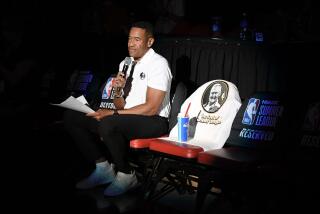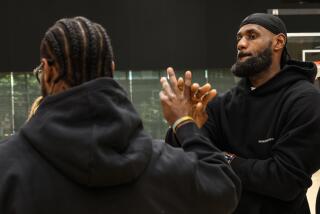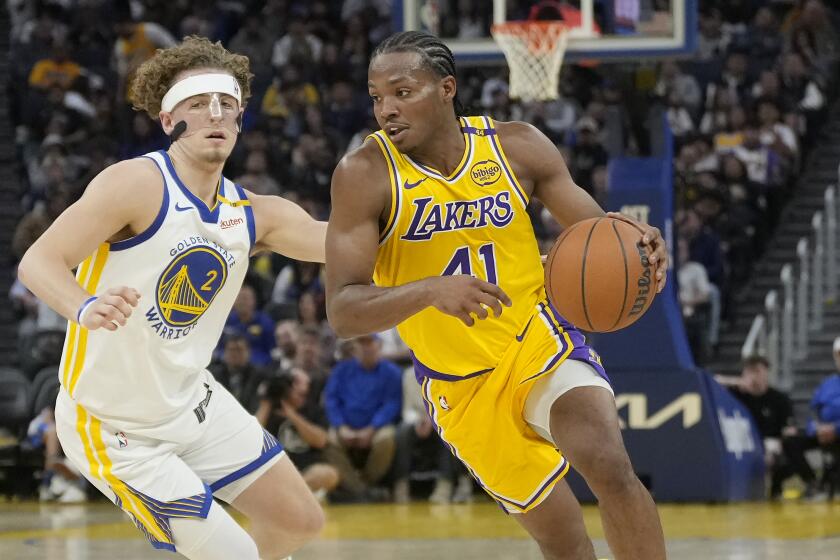This is how he rolls
The first time Mitch Kupchak was mentioned for one of the most glamorous jobs in sports, general manager of the Lakers, he was standing at a urinal.
An All-American at North Carolina who became a starting power forward for the Showtime-era Lakers, Kupchak’s career was cut short after an injury in 1981 that shattered his left knee. After a limited comeback, Kupchak agreed to move over to the front office in 1986 to serve an apprenticeship under then-general manager Jerry West.
“About the second week I was there, I’m standing in the bathroom at the Forum . . . when the door flies open and Jerry walks in, face red, smoke shooting out of his ears, every other word a four-letter word,” Kupchak recalled recently. “He’s ranting and raving, talking to me, but not really talking to me even though there’s nobody else in there. I’m petrified.
“ ‘You know, I’ve had enough. I’m telling Dr. [Jerry] Buss I’m quitting and I’m recommending you for the job.’ And then he walked out,” Kupchak recalled West saying. “I’m still . . . staring straight ahead at the wall, saying to myself, ‘I don’t know if I’m ready for this job.’ ”
Kupchak need not have worried. West wasn’t going anywhere for 14 years, although he would periodically threaten to bolt as his job anxiety continued to rise.
When West finally stepped aside in 2000, Kupchak felt he was qualified to take the reins from the front-office legend. Others weren’t so sure. There was a perception that West continued to pull the strings, first as a Lakers consultant, then from the golf course in retirement, and even, went the uninformed chatter, from Memphis after West went there in 2002 to revive the Grizzlies.
“That perception is so grossly unfair,” said West, once again retired. “Mitch is his own man.”
West left a smoothly running dynasty that initially required Kupchak to do little more than add a few role players as the team went on to complete a three-year title run.
Then came some heavy lifting. Karl Malone and Gary Payton came and went, Shaquille O’Neal was traded, and Kobe Bryant, apparently horrified at the prospect of wasting his prime years on a not-ready-for-prime-time team, began to question the front office, quietly at first and then very publicly.
There was the 2005 trade of Caron Butler to Washington. “My best friend gets shipped out without me knowing,” Bryant said. It didn’t help that Kwame Brown, who came west in exchange, was a bust.
There were questions about the drafting of Andrew Bynum and Jordan Farmar. There was the failure to consummate a deal with the Minnesota Timberwolves for Kevin Garnett and Kupchak’s refusal to part with Bynum in a possible deal for Jason Kidd -- a decision Bryant ripped in a fan’s notorious video.
“I was on Mitch’s [butt],” Bryant conceded. “It was just rough for me . . . not having anything done. It was extremely frustrating. We had talks privately about trying to do something to be more aggressive and make changes and still nothing got done.”
All the while, Kupchak had the support of Buss, the only man who really matters.
“I saw all the criticism of Mitch and I knew he didn’t deserve it,” Buss said. “People would ask me, ‘What are you going to do about Mitch Kupchak?’ And I would reply, ‘Support him 100% just like I always have.’ ”
That support was rewarded with two key deals. In November, Kupchak obtained Trevor Ariza, a solid defender, from the Orlando Magic for Maurice Evans and Brian Cook.
Then came the move that turned around a season and Kupchak’s image. On Feb. 1, he obtained forward/center Pau Gasol from the Grizzlies for Brown, Javaris Crittenton, two draft picks and other considerations.
“[Kupchak] had the patience to sit on the Kwame piece and pulled off the coup de grace,” Bryant told reporters recently. “He goes from an F to an A-plus.”
Once again, Mitch Kupchak had exceeded expectations.
Growing up on Long Island, Kupchak said his first love was baseball -- the New York Yankees his team, Mickey Mantle his favorite player.
“I’d sit in our kitchen on a Sunday afternoon listening to a doubleheader on the radio,” Kupchak said. “My mom thought there was something wrong with me.”
He envisioned himself as a third baseman, but his body had other ideas. Kupchak soon towered over his peers.
“My strike zone kept getting bigger,” he said.
Stan Kellner, the basketball coach at nearby Brentwood High, spotted the 14-year-old Kupchak, then 6 feet 4, walking down the hallway in junior high.
“He grabbed me right there and became one of the most influential people in my life,” Kupchak said.
Kupchak blossomed under Kellner, learning the intricacies of the game at a basketball camp, excelling in high school and winding up at North Carolina.
A first-round draft choice of the Washington Bullets in 1976, Kupchak, by then 6-9 and 230 pounds, spent five seasons there.
But his life changed because of a picnic held in a Palm Springs park. Buss had invited Magic Johnson to share a basket of food after the Lakers had been upset in the first round of the 1981 playoffs.
“You tell me what I have to do to win,” Buss recalled saying to Johnson.
“If we could get Mitch Kupchak, I know we could win,” Johnson replied.
So the Lakers acquired Kupchak and signed him to a 14-year contract (seven playing years, seven in management) for nearly $8 million.
The final piece of the Showtime puzzle? It seemed that way until the 26th game of Kupchak’s first Lakers season. Facing the San Diego Clippers, Kupchak drove the middle, found Clipper Joe Bryant (Kobe’s father) blocking his path, and planted his left leg in an attempt to pull up and avoid the charge. Instead, the leg buckled, fracturing his knee and causing cartilage and ligament damage.
As he began the long road to recovery, Kupchak took a detour to UCLA to pursue a master’s degree in business.
“My career was in jeopardy after four months in Los Angeles,” Kupchak said. “I felt I had to be able to provide something for the organization other than a political science and psychology degree. I rehabbed two hours a day, but what else was I going to do? Going back to school was good therapy.”
He missed the rest of that season and the next, but came back for three seasons as a reserve. But he was never again the player he had been.
“Jerry [West] would watch me limp up and down the court and ice my knee,” Kupchak said. “He said to me, ‘Mitch, you don’t have to do this. I see what you are going through. You know, I could use some help in the front office.’ ”
Kupchak retired at the end of the 1985-86 season and became West’s assistant.
“From day one, all Jerry West did was give me responsibility,” Kupchak said. “He challenged me. . . . He wasn’t trying to protect his turf. He wasn’t questioning what my motives were. He was great, a true mentor.”
Said West, “To me, it was an easy decision to bring Mitch in. With his business experience, it was a perfect fit. We are two people who really liked each other and respected each other. It was the start of a really special relationship.”
Kupchak remembers the moment he realized the working relationship was over. It was the morning in June 2000 after the Lakers had beaten Indiana for the championship.
Unable to bear watching in person the team he had built, West spent the night driving around Malibu, listening to the game on the radio.
When Kupchak got to work the next day, he recalled, he found West already in his office. With the door ajar, Kupchak peeked in. West was seated at his desk in the dark, staring straight ahead, eyes bloodshot. West acknowledged Kupchak in a low, somber voice.
“That’s not what you expect when you just won a championship less than 12 hours earlier,” Kupchak said. “When I left Jerry, I told myself, ‘This may be it.’ ”
West briefly stayed on as a consultant.
“I didn’t bring him into the decision-making process very often,” Kupchak said. “He retired to get away from that pressure. We spoke a lot, but all I ever asked him was to maybe compare two players, exchange rumors, that kind of stuff. When I did something that he thought was a positive thing, he would call. But if I did something he didn’t think was positive, he just wouldn’t call, so I knew the answer.”
Kupchak shrugs off any public perception that he was constantly on the phone with West and that West still deserved much of the credit for the Lakers’ success.
“Didn’t bother me,” he said. “That was never important to me.”
Indeed, Kupchak, 53, abhors the spotlight. He was reluctant to be interviewed for this story, and guards his family’s privacy, refusing to reveal the names or ages of his two children. Asked to be photographed, he insisted on including Ronnie Lester, his assistant.
While Buss remains supportive, he, too, would like to see some of the credit shared.
“I had a lot of faith in Mitch, and there have been no surprises,” Buss said. “It’s never been like, ‘Oh my God, you did what?’ But I think it should be pointed out that my son Jim [a team vice president] was equally responsible for the drafting of Andrew Bynum. After Jim saw Bynum in a workout, he said, ‘This is someone we must have, no ifs, ands or buts.’ ”
Jerry Buss said it was he who initiated the idea of obtaining Gasol.
“I saw that he said in the paper he wanted to be traded,” Buss said. “Knowing that Memphis was losing a great deal of money, I suggested we pursue it. Mitch made the call, but it was Jim who also stayed on it.”
Kupchak said his toughest time on the job came in the summer of 2004, when the Lakers had traded O’Neal, but Bryant had not yet decided whether he would stay with the Lakers or join the Clippers.
“I was told Kobe would let both clubs know his decision on the morning he was eligible to sign,” Kupchak said. “I was in my office when I heard, ‘Mitch, Kobe’s on the phone.’ That was a pretty high-stress moment. I got on and he said, ‘Mitch, I want to be a Laker.’ ”
And a Laker Bryant remains, not only leading the team back into contention for the NBA championship, but leading cheers for the once-beleaguered general manager.
Kupchak, though, is ever-cautious: “In six months, I could be back to an F.”
--
--
Begin text of infobox
All the right moves
Lakers General Manager Mitch Kupchak played his cards right by not dealing Kobe Bryant and Andrew Bynum and later trading for Trevor Ariza and Pau Gasol.
HOLD
Frustrated by the lack of off-season moves, Bryant asked to be traded. Kupchak and the Lakers brass did not like the offers and kept their superstar.
HOLD
Kupchak’s refusal to part with young center Bynum in a possible deal for Jason Kidd was ripped by Bryant, but it turned out to be the right call.
DEAL
On Nov. 20, Kupchak obtained Ariza, a solid defender, from the Orlando Magic for seldom-used guard Maurice Evans and inconsistent forward Brian Cook.
DEAL
Bryant gave Kupchak an “A-plus” for the Feb. 1 Gasol trade: “He had the patience to sit on the Kwame [Brown] piece and pulled off the coup de grace.”
Los Angeles Times
More to Read
All things Lakers, all the time.
Get all the Lakers news you need in Dan Woike's weekly newsletter.
You may occasionally receive promotional content from the Los Angeles Times.








